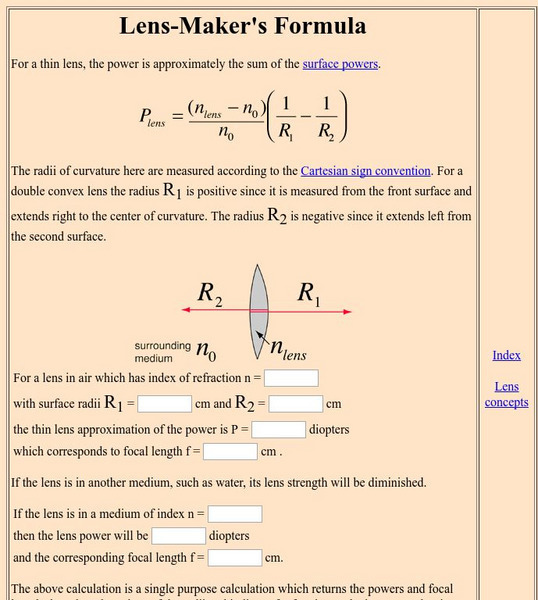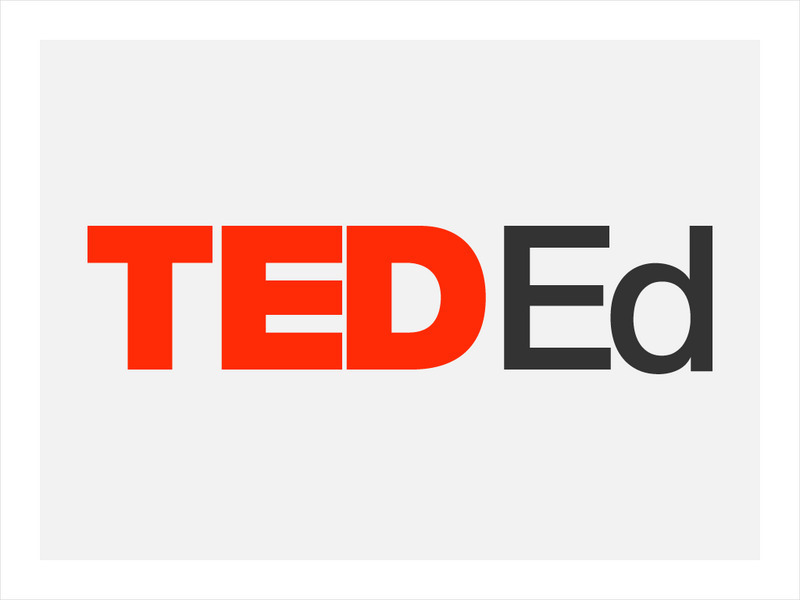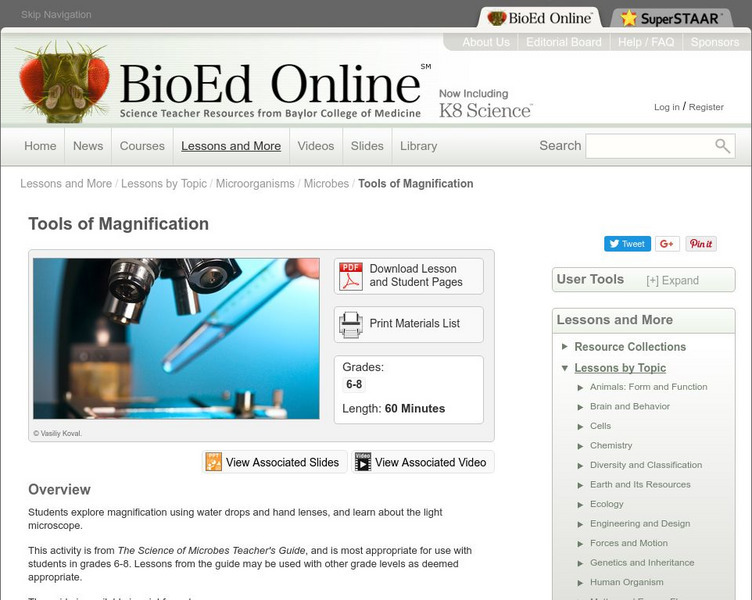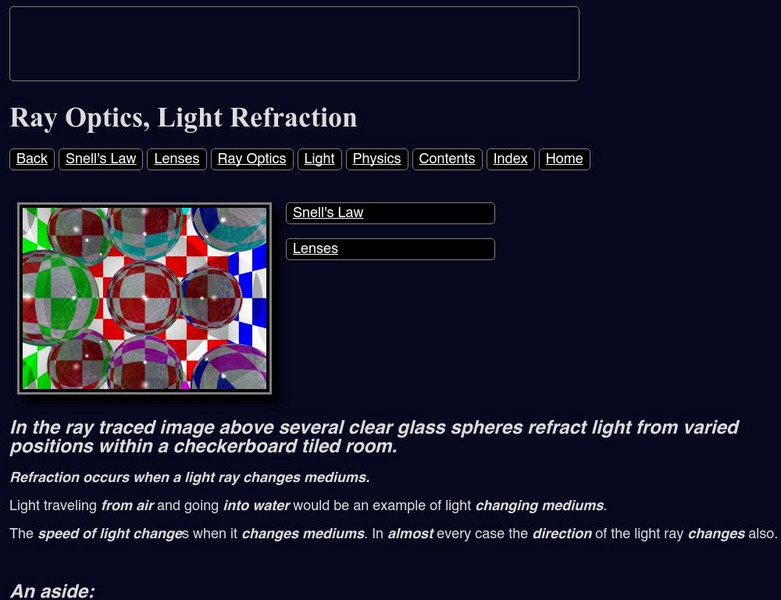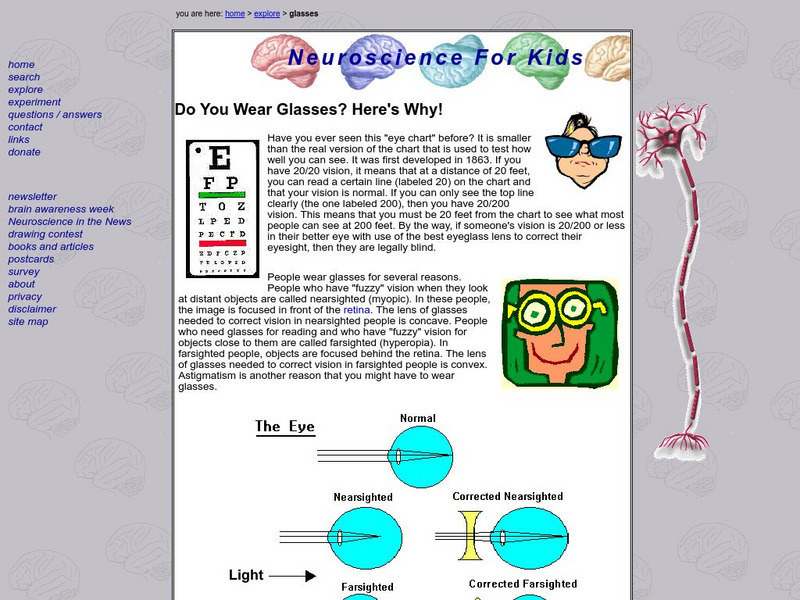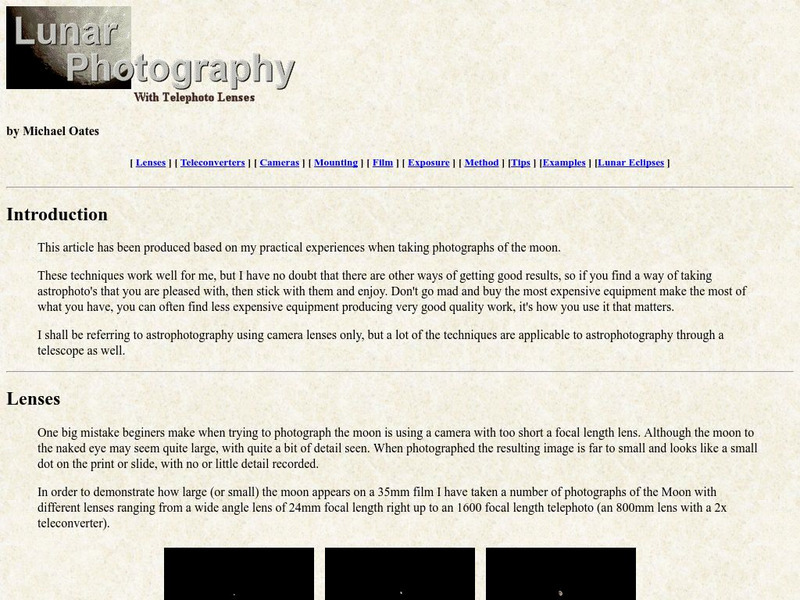Curated OER
Light and Optics
Middle schoolers discover the relationship between lens shape and the formation of images in an experiment. They use three different size converging lenses and a diverging lens to calculate and compare the focal length of each. They...
Curated OER
Mirrors and Lenses
Students identify the characteristics of mirrors and lenses. In groups, they describe the types of images formed by converging and diverging mirrors and calculate the magnification of a spherical mirror. They follow the same procedure...
Curated OER
Light Gathering Power
Learners compare and calculate the light gathering power of lenses. They determine the ability of various lenses and mirrors to gather light.
Georgia State University
Georgia State University: Hyper Physics: Lens Maker's Formula
A discussion of the lens-maker's formula and its use in determining the effect of lens shape and index of refraction upon the magnifying power of a lens. Includes an interactive problem-solving section.
Georgia State University
Georgia State University: Hyper Physics: Thin Lens Equation
This is an informative site from Georgia State University. It gives a discussion of the thin lens equation and an illustration of its use in determining the image distance based upon the object distance and the focal length.
TED Talks
Ted: Ted Ed: The Story Behind Your Glasses
Video describes the developments and advancements in the history of the study of optics. [4:17] Includes a short quiz and a list of additional resources to explore.
BioEd Online
Bio Ed Online: The Science of Microbes: Tools of Magnification
The invention of magnifiers that allow us to see things that are otherwise invisible to us has revolutionized science. For this lesson, students use several types of magnifiers to investigate magnification, and record their observations....
University of New South Wales (Australia)
University of New South Wales: School of Physics: Physclips: Geometrical Optics
Physiclips thoroughly presents geometrical optics concepts like rays, refraction, Snell's law, total internal reflection, dispersion, mirrors, and lenses with animations and film clips.
University of Wisconsin
The Why Files: Electronic Eye Is Biological Eye
Lenses make a distorted image on the back of a camera, especially at the edge. A revolutionary camera eliminates distortion with a curved light detector.
University of Colorado
University of Colorado: Ph Et Interactive Simulations: Bending Light
Manipulate variables and measure angles as light is refracted in this interactive simulation.
Optical Society
Optical Society of America: Optics for Kids: Lenses and Geometrical Optics
Article explaining what lenses are and how they work. At the end of the article, there are links to several hands-on activities for investigating lenses.
CK-12 Foundation
Ck 12: Concave and Convex Lenses
[Free Registration/Login may be required to access all resource tools.] Students describe and predict image formation as a consequence of refraction through a thin convex lens.
Curated OER
Ray Optics, Light Refraction
Site studies light refraction and provides illustrations several illustration. Contains links to Snell's Law, lenses, ray optics, light and much more.
University of Maryland
Optics Highlights: The Microscope
Part of an anecdotal history of optics and the study of light. Extremely thorough treatment of the scientific findings and developments which led to the invention and refinement of the microscope. Includes a short biographical sketch and...
University of Washington
Neuroscience for Kids: Do You Wear Glasses?
Have you ever wondered why you may or may not have to wear glasses? Use this explanation to find out the answer. It outlines the normal eye, the nearsighted eye and the farsighted eye. The diagrams are helpful for a more comprehensive...
My Science Site
Mirrors, Lenses and Your Eyes
This resource explores the science behind light and how mirrors reflect it. Also contains information on lenses both convex and concave.
Other
Mas: Lunar Photography With Telephoto Lenses
Ever taken a picture of a nice large full Moon, only to find that it looks like a small dot on your finished photograph? This site explains why, and offers tips on taking good pictures of the Moon.
Center of Science and Industry
Cosi Columbus: Two Lenses in One
Investigate the behavior of a water filled vial, and discover why it acts like a magnifier. Includes full list of materials, procedures, and scientific explanation of what causes light rays to change direction.
My Science Site
Optics: Energy and Control [Pdf]
A very comprehensive unit including topics such as light and its source, visible sources of light, transparency of objects and much more. Also offers a resource list, blackline masters, and expectation list, expectation summary and a...
CK-12 Foundation
Ck 12: Plix: Concave Lens: Lens
[Free Registration/Login Required] Change the size of the object and see how a concave lens generates a real image.
CK-12 Foundation
Ck 12: Plix Series: Double Concave Lenses
[Free Registration/Login Required] Change the focal point in this interactive concave lens to see how the focal length changes.After the activity, answer a challenge question to check for understanding.
CK-12 Foundation
Ck 12: Plix Series: Double Convex Lens: Convex Lens
[Free Registration/Login Required] Change the focal point in this interactive convex lens to see how the focal length changes. After the activity, answer a challenge question to check for understanding.
Synopsys
Synopsys: Learn About Optics
Highly informational optic site for kids provides everything one might want to know about light. Various topics include light basics, controlling light, lenses, complex lenses, what's cool about lasers and much more!
TOPS Learning Systems
Tops Learning Systems: Top Science: Pinhole Microscope [Pdf]
Create and use a pinhole magnifier.





